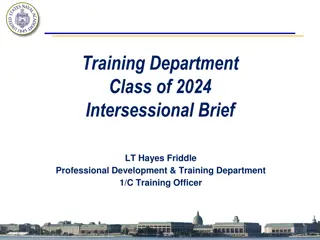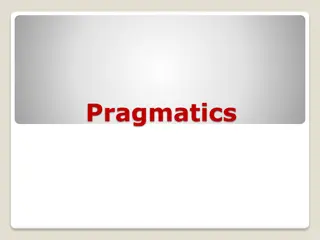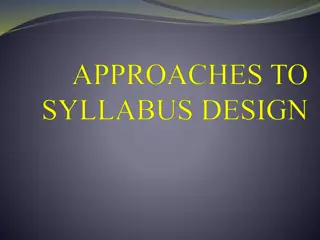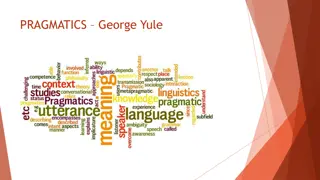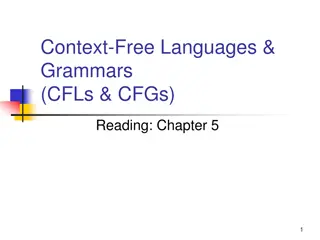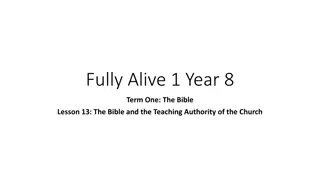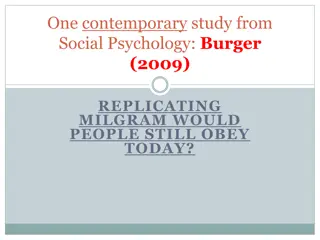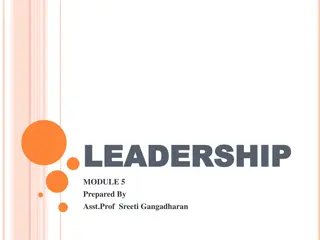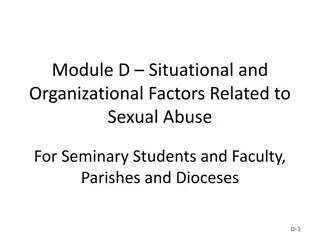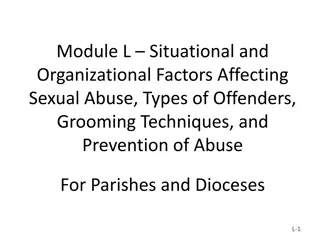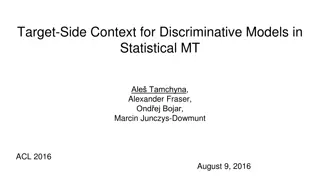SA Post Office Financial Analysis and Challenges
An analysis of the SA Post Office's income statement, creditors, financial trends, challenges, and situational context. It also outlines the Post Office of Tomorrow strategy and strategic pillars.
5 views • 16 slides
How to Protect Yourself and Prevent Dangerous Situations
Discover essential active threat survival tactics from Dr. Mike Monroe Kiefer. Learn mindset readiness, situational awareness, and safety tips for various scenarios.
1 views • 52 slides
Summer Training Department Briefing for Class of 2024
Intersessional briefing for the Class of 2024 by LT Hayes Friddle covering professional development, summer accountability, Bancroft berthing details, general rules, liberty eligibility criteria, and more. The agenda includes staying at USNA, maintaining situational awareness, fleet cruises, and tra
1 views • 24 slides
Health, Safety, and Wellbeing Update: September 2023
The September 2023 update focuses on noteworthy incidents, safety alerts, positive feedback, critical risk stats, and well-being initiatives. It includes valuable tips for workplace safety, highlighting incidents and safety precautions to ensure a healthy and safe working environment. The update als
0 views • 18 slides
Initial Operational Response (IOR) to Incidents Involving Hazardous Substances: January 2023
Increase knowledge, understanding, and awareness of the revised IOR Guidance through key objectives, principles, and stages of response. Learn about maximizing public safety, minimizing risks, and efficient transition to Specialist Operational Response (SOR). JESIP principles emphasize co-location,
3 views • 25 slides
2023/24 Annual Performance Plan Presentation for Small Business Development Department
The presentation outlines the 2023/24 Annual Performance Plan of the Department of Small Business Development, covering situational analysis, global economic outlook, performance priorities, game-changers program, alignment with economic recovery plans, institutional program performance, key risks a
27 views • 59 slides
Understanding Human Behavior: Foundations and Complexity
Human behavior encompasses the actions and interactions of individuals influenced by factors like genetics, culture, and situational contexts. It involves observable overt behaviors as well as hidden covert behaviors, with a dynamic interplay between individuals and their environments. Psychologists
8 views • 20 slides
Importance of Context in Discourse Analysis
Understanding context is crucial in discourse analysis as it helps interpret the meaning of words based on physical, social, and psychological factors, as well as the temporal and spatial dimensions of communication. Three key types of context include situational, background knowledge, and co-textua
1 views • 12 slides
Enhancing Endoscopy Nursing Through Simulation Practices
Endoscopy nursing relies on effective teamwork, especially in rare emergency situations. Simulated practices provide a safe space for nurses to improve their skills and situational awareness. This article highlights the benefits of simulation in endoscopy nursing education, focusing on familiarizing
2 views • 15 slides
Impact of Situational Leadership Readiness in Elementary School
The study explores how situational leadership styles, specifically in the dimensions of Selling, Telling, Participating, and Delegating, impact elementary school leadership. Research conducted at an elementary school in Ciniru, Kuningan, relied on qualitative methods including observation, interview
1 views • 10 slides
Understanding Personality: Traits, Characteristics, and Influencing Factors
Personality is the unique combination of physical, mental, and behavioral traits that define an individual. It encompasses characteristics like smartness, dress sense, attitudes, and values. Personality is influenced by biological, environmental, and situational factors, and can be analyzed through
1 views • 49 slides
2024 Safety Focus Areas Glider
This comprehensive guide covers key safety focus areas for glider pilots, emphasizing the importance of positive aircraft control, instructor intervention, emergency procedures, and post-accident/incident notification. It highlights critical topics such as maintaining situational awareness, handling
0 views • 9 slides
Enhancing Reading Skills Through Effective Strategies
Learn how to improve reading proficiency by leveraging letter-sound correspondences, syllabication patterns, and morphology. Enhance word recognition capabilities, reading comprehension, and oral reading fluency. Discover valuable techniques such as leveraging prefixes and suffixes, mastering multi-
1 views • 19 slides
Exploring Pragmatics in Linguistics Studies
Pragmatics delves into the study of implied meanings and how we interpret language in various contexts. It focuses on understanding communication beyond explicit words and explores the invisible meanings conveyed through situational and linguistic contexts. Deixis, physical context, and linguistic c
0 views • 41 slides
Understanding Language Teaching Syllabus: Integration, Theory, and Approaches
Language Teaching Syllabus involves the integration of subject matter and linguistic elements, guided by theories of language and learning. Various approaches like Grammatical, Situational, Communicative, and Analytic are used to structure syllabi. Breaking language into parts aids in sequential lea
1 views • 28 slides
Understanding Irony in Verbal, Dramatic, and Situational Contexts
Explore the nuances of verbal, dramatic, and situational irony through examples and explanations. Verbal irony involves saying something different from what is meant, often using humor like puns. Dramatic irony occurs when the audience knows something the characters don't, creating suspense. Situati
0 views • 12 slides
Understanding Hospital Bed Turnover and Situational Leadership Characteristics
Hospital bed turnover is crucial for assessing hospital productivity, with turnover interval (TOI) indicating the average period a bed remains empty. Bed turnover rate (BTR) measures patient care efficiency. Situational leadership, adaptable to group needs, involves directing and coaching based on g
2 views • 7 slides
Overview of Pragmatics and Deixis According to George Yule
Pragmatics and Deixis are crucial aspects of language understanding, as explored by George Yule. Pragmatics focuses on the use of language in context, while Deixis involves pointing via language to convey meaning based on the immediate context. Deictic expressions play a significant role in face-to-
0 views • 19 slides
Exploring Situational Leadership and Mindset in Educational Leadership
This educational session delves into Situational Leadership, utilizing the Hersey-Blanchard framework, to tailor leadership approaches based on the mindset, skill, and will of educators. It also discusses growth versus fixed mindsets and includes a practical mindset vignette for application. Partici
0 views • 13 slides
Overview of Grammar Types and Chomsky Hierarchy
The four types of grammars are General, Context-Sensitive, Context-Free, and Linear grammars, each recognizing a specific set of languages. Chomsky Hierarchy categorizes these grammars into four levels, indicating subsets of languages they can recognize. Context-free grammars have specific productio
0 views • 17 slides
Enhancing Defensive Skills and Situational Awareness in Hockey
Enhancing defensive skills and situational play in hockey is crucial for success. All team members can contribute to team defense by developing skills like skating, body checking, understanding the ice surface defensively, read and react abilities, and effective communication. Proper skating skills
3 views • 45 slides
Understanding Context-Free Languages and Grammars
Context-Free Languages and Grammars (CFLs & CFGs) are essential in theoretical computer science, providing a framework for recognizing non-regular languages. This content explores the distinction between regular and context-free languages, delves into the construction of language recognizers using c
0 views • 40 slides
PipeSwitch: Fast Context Switching for Deep Learning Applications
PipeSwitch introduces fast pipelined context switching for deep learning applications, aiming to enable GPU-efficient multiplexing of multiple DL tasks with fine-grained time-sharing. The goal is to achieve millisecond-scale context switching overhead and high throughput, addressing the challenges o
1 views • 38 slides
Understanding the Context of Bible Stories and Church Teachings
Explore the importance of context in understanding Bible stories and church teachings, including discussions on Magisterium, Sacred Tradition, and the role of the Church in interpreting scripture. Learn how context enhances our comprehension of religious texts and traditions. Delve into examples hig
0 views • 13 slides
Understanding Irony: Verbal, Dramatic, and Situational Examples
Dive into the world of irony with examples of verbal, dramatic, and situational irony explained through scenarios like sarcastic comments, horror movie twists, and unexpected encounters. Explore how irony adds layers of meaning and depth to storytelling, from characters knowing more than others to o
0 views • 10 slides
Understanding Attribution Theory: Exploring Dispositional vs. Situational Attribution
Attribution theory examines how people explain behavior and events by analyzing internal vs. external causes. Heider's influential ideas on dispositional vs. situational attributions are discussed. Dispositional attribution focuses on internal characteristics, while situational attribution relates b
0 views • 14 slides
Efficient Context Switching for Deep Learning Applications Using PipeSwitch
PipeSwitch is a solution that enables fast and efficient context switching for deep learning applications, aiming to multiplex multiple DL apps on GPUs with minimal latency. It addresses the challenges of low GPU cluster utilization, high context switching overhead, and drawbacks of existing solutio
0 views • 46 slides
Exploring "The Sniper" by Liam O'Flaherty: Historical Context and Literary Elements
Delve into the world of "The Sniper" by Liam O'Flaherty with pre-reading notes, background information on the Irish Civil War, and post-reading analysis of literary elements like point of view and irony types. Meet the writer, Liam O'Flaherty, and understand the dramatic and situational ironies used
0 views • 15 slides
Replicating Milgram's Obedience Study: Burger's Contemporary Research
Burger's 2009 study aimed to partially replicate Milgram's famous obedience experiments to explore if obedience levels have changed over time, focusing on the influence of situational factors. Using a similar setup, Burger found that individuals still exhibit high obedience rates, challenging assump
0 views • 44 slides
Conducting Threat Assessments Through the Atrocity Prevention Lens
This module from the GLOBAL CENTRE FOR THE RESPONSIBILITY TO PROTECT focuses on conducting threat assessments through an atrocity prevention lens. It covers risk identification, situational awareness in field settings, information collection methods, addressing vulnerabilities of women and children,
0 views • 20 slides
Messy Situational Map Template with Suggestions for Use
This SA template provides a messy situational map template along with suggestions for use. The initial map should be done by hand on a large piece of paper to allow for quick adjustments and capturing thoughts. The template includes an abstract map and a customizable version for creating more readab
0 views • 4 slides
Comprehensive Overview of Leadership Theories and Styles
Leadership encompasses the ability to influence a group towards achieving goals by knowing oneself, communicating vision, building trust, and taking effective action. Various leadership styles include Autocratic, Democratic, Free-Rein, and Paternalistic, each with distinct decision-making approaches
0 views • 19 slides
Understanding Assessment Centres: Psychometric Tests, Situational Judgement, and More
Assessment centres often include psychometric tests, ability testing, and situational judgement assessments to evaluate candidates. These tests help employers understand your personality, behaviours, decision-making skills, and ability to work in different scenarios. By participating in these assess
0 views • 25 slides
Leadership Insights: Traits, Differences, and Framework
Leadership involves guiding others towards shared goals through vision, inspiration, knowledge, and resilience. It distinguishes from management in focus and approach. Analyzing leadership involves assessing leader traits, situational factors, and follower dynamics. The leadership framework comprise
0 views • 36 slides
Situational and Organizational Factors in Sexual Abuse by Catholic Priests
The content discusses situational and organizational factors related to sexual abuse involving seminary students, faculty, parishes, and dioceses. It covers settings and circumstances of sexual abuse, including locations where victims first encountered abusive priests. Data reports from the United S
0 views • 28 slides
Understanding Situational Factors in Sexual Abuse by Catholic Priests
This module delves into the situational and organizational factors influencing sexual abuse of minors by Catholic priests, exploring types of offenders, grooming techniques, and prevention strategies for parishes and dioceses. It highlights key data reports on sexual abuse cases, examines settings a
0 views • 49 slides
Importance of Context in Statistical Machine Translation
Understanding the significance of context in machine translation is crucial for improving accuracy and disambiguating word sense. This research delves into the impact of target-side context for discriminative models in statistical machine translation, showcasing how context influences model performa
0 views • 29 slides
Understanding Situational Crime Prevention Strategies
Situational crime prevention strategies aim to reduce crime by altering environmental conditions, influencing offender decisions, and targeting crime opportunities. Primary prevention focuses on modifying physical and social environments, while secondary prevention aims to identify potential offende
1 views • 31 slides
Understanding Irony: Types, Purpose, and Examples
Irony is about expectations and contrast between reality and what is being said. It can add interest, depth, suspense, and humor to texts. The three types of irony are verbal, dramatic, and situational, each serving a unique purpose to engage the audience. Examples from popular stories like Beauty a
0 views • 12 slides
Enhancing Situational Awareness for Home Visit Safety
Situational awareness is crucial for observing and being attentive to your surroundings to prevent accidents and errors. Understanding different levels of situational awareness, from a relaxed alert state to an active threat response, can significantly improve safety and decision-making in everyday
0 views • 14 slides


